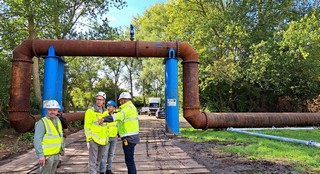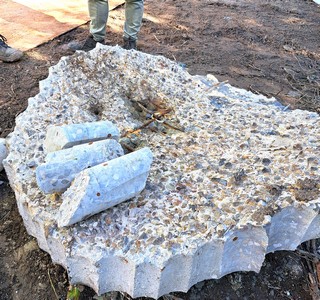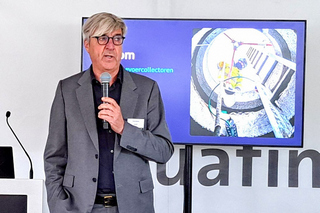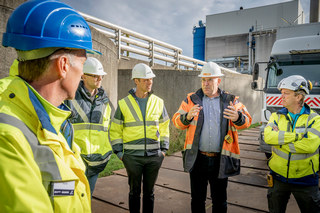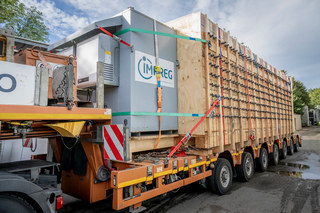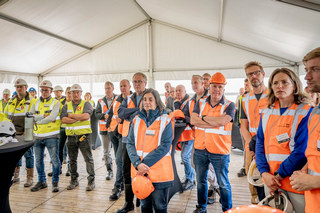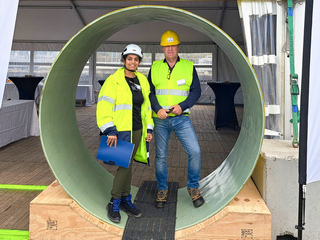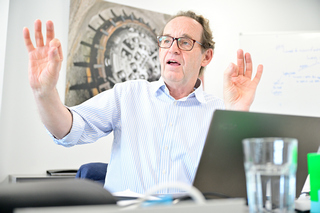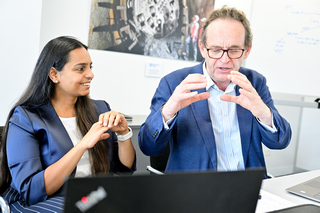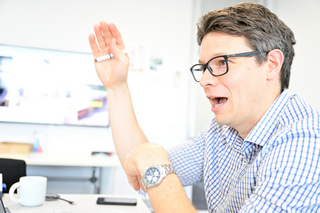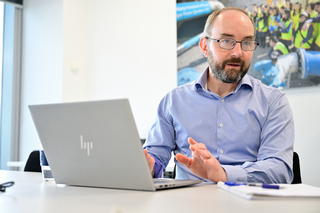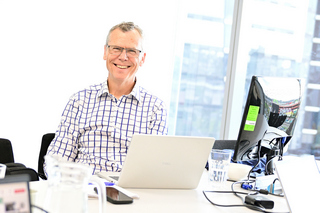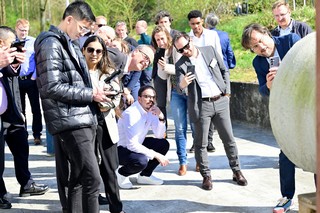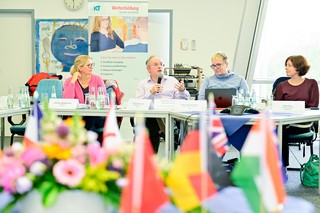
IKT Internatonal Conference “Sewers for the 21st Century II” took place on 11. – 12. September 2024 in Gelsenkirchen, Germany.
Held to celebrate
IKT – Institute for Underground Infrastructure’s 30th anniversary, on September 11th and 12th, 2024, in Gelsenkirchen, Germany, the event brought together IKT’s research collaborators with sewer and urban drainage network owners from around the world.
The value of providing face to face opportunities for international exchanges in experience to address common problems was the key takeaway from IKT’s recent, in person, “Sewers for the 21st Century II” International conference.
The feedback from guests confirmed the conference was a resounding success, fostering an environment of collaboration and knowledge exchange. With a focus on resilience, sustainability, and innovation in sewer and urban drainage systems, attendees left with new insights, strengthened personal networks, and a shared vision for the future.
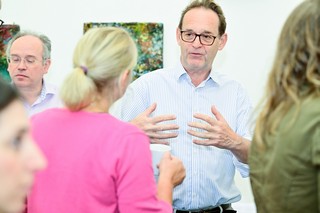
Dr Iain Naismith, IKT
The event took place was exactly as planned – by providing an informative and relaxing environment for our guests to hear and exchange their ideas for solving issues they face with ageing infrastructure and climate change adaptation. There was with plenty of time and opportunity in the programme to get to know each other, develop new contacts and initiate future collaboration.
Day 1: International Perspectives on Sewerage Issues
Session I was planned as a series of short presentations on current issues from different countries, we initially heard how different regions are tackling the challenges of ageing sewer networks and urban drainage systems.
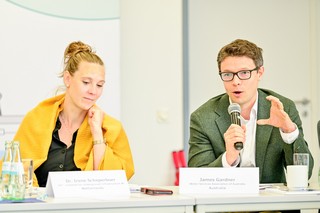
Dr. Irene Scheperboer, IKT, with James Gardner, WSAA
The event began with a warm welcome from IKT’s Managing Director,
Roland W. Waniek, followed by an introduction from Dr Iain Naismith, Senior Research Fellow and International Project Manager at IKT.
The first session, centered on the key sewerage issues of the 21st century, highlighted diverse experiences from around the world.
- James Gardner, Water Services Association of Australia, opened the discussions with a presentation on environmental research innovations in Australia and New Zealand.
- Dr Ajit Salvi, Brihanmumbai Municipal Corporation, India, particularly focused on the issue of improving the health and safety of sewage workers.
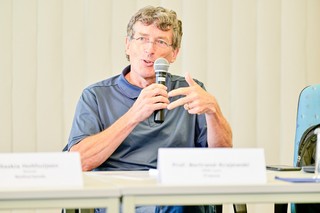
Prof. Jean-Luc Bertrand-Krajewski, INSA, Lyon/France
- Prof. Jean-Luc Bertrand-Krajewski, INSA Lyon, France, used coping with the consequences of urban sprawl in the City of Lyon as a case study for issues in France.
- Wendy Franken, Vlario, Belgium, emphasized collaboration between sewer network owners on multi-year planning, implementing rainwater and drought plans, making space for water and budgeting. In her role as President of the EWA (European Water Association), she also highlighted addressing implementation of the revised Urban Wastewater Treatment Directive.
- Saskia Holthuijsen, Stitching Rioned, The Netherlands, highlighted additional issues including recruitment to the sector, digitalisation, circular economy and energy.
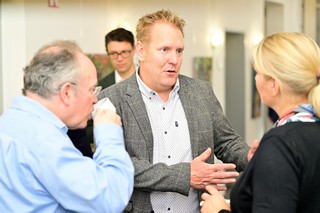
Tom Ogden, Yorkshire Water, UK
- Thomas Ogden, Yorkshire Water, United Kingdom, considered dealing with storm overflows, flooding and pollution and explained how collaborative research was addressing issues.
- Thomas Brueggemann, IKT, Germany explained how changes in climate, demographics, sustainability and technologies are affecting networks and how collaboration between municipalities was helping address some issues.
The session gave guests a broad view of how countries are working to future-proof their infrastructure.
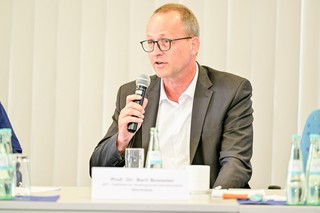
Prof Dr Bert Bosseler, IKT
In the afternoon IKT’s Scientific Director,
Prof. Bert Bosseler, gave a vision of where IKT is heading in its research and knowledge sharing on risk-oriented asset management and rainfall management, before guests were given a conducted tour of new research facilities and current projects.
IKT has just taken over from the builders its new Materials Testing Laboratories, which have EU funding support for their construction, to enable us to stay ahead of the curve in testing the new materials and products being brought to market. Dieter Homann, Director of Materials Testing and his team demonstrated a range of new testing machines including impact testing, visual inspection and destructive testing.
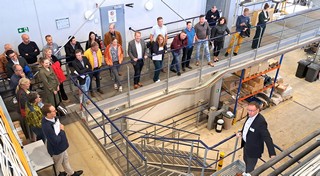
Visiting IKT’s laboratory with Dieter Homann, Director Material Testing, IKT
The current research element of the tour comprised first a
viewing of the Mini-MAC, a novel non-destructive inspection system for determining the structural stability of pipes and the pipe-soil system in smaller diameter pipes.
In the yard outside the laboratory guests viewed and discussed 1:1 scale test rig mock-ups and pipe damage scenarios for our current LinKa project examining the limits of performance of CIPP lining, end sealing and lateral connection repair of larger diameter pipes.
LinKa (‘Liners für Kanalisation’ (sewers)) and
Linka Partner Projects – International Collaboration
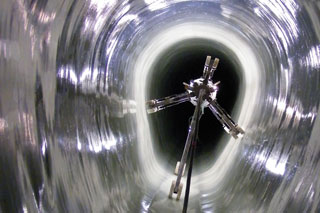
LinKa project examining the limits of performance of CIPP lining
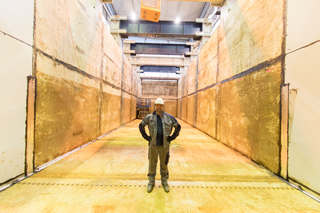
IKT large test facility, an 18m x 6m x 6m floodable test chamber for 1:1 scale underground infrastructure evaluation
Guests also viewed the
IKT large test facility, an 18m x 6m x 6m floodable test chamber for 1:1 scale underground infrastructure evaluation. This is currently being prepared to host LinKa project test rigs to determine how complete CIPP systems (liner, manhole end seals and later connection repairs against groundwater pressure.
They also heard how IKT plans to develop its rainfall/urban drainage testing facilities with a new laboratory building for a large rainfall generating test rig and enhancement to the large test facility and flow rig capabilities. These are also supported by EU research infrastructure funding.
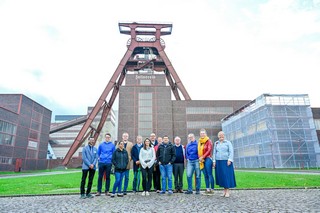
Guided tour of Zollverein Coal Mine Industrial Complex, a UNESCO World Heritage site in the city of Essen, Germany
Guided tour of Zollverein Coal Mine
North Rhine-Westphalia has been grappling with sewer and urban drainage issues relating to its coal mining and industrial heritage and its impact on subsidence, topography and ground water levels.
It was therefore fitting that guests were treated to an evening guided tour of Zollverein Coal Mine Industrial Complex, a UNESCO World Heritage site, where they could hear about and see this history. This also tied in with a visit the next day to see new sewer pumping station facilities.
Day 1 finished with a Conference Dinner near the Zollverein Mine.
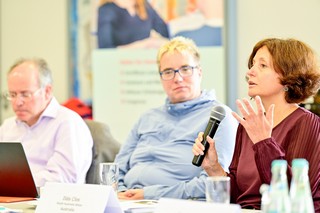
Ilda Clos, South Australia Water
Day 2: Addressing Ageing Infrastructure and Innovation
The second day continued two sessions focusing on extending the life of ageing sewer infrastructure and new innovations.
Innovation in Urban Drainage Technology
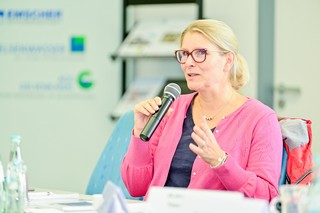
Caroline Wadsworth, Isle Utilities, UK
The final session of the conference emphasized innovation in urban drainage technology.
- Caroline Wadsworth, Isle Utilities, United Kingdom, inspired the audience by showing how innovations can move from concept to implementation.
- Aaroh Swarup, Indian Society for Trenchless Technology, discussed bold steps in subsurface markets in India.
- Prof. Simon Tait, University of Sheffield, United Kingdom introduced Pipebots, a cutting-edge technology that deploys autonomous robots for sewer inspection and repair.
- The session concluded with a presentation on the progress with the EU funded Co-UDlabs Project by Prof. Jean-Luc Bertrand-Krajewski, INSA Lyon, France, which is a collaborative community of seven urban drainage laboratories, including INSA, Sheffield University and IKT.
Consortium of Urban Drainage Laboratories
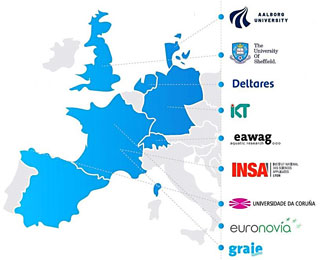
Across borders: research institutions from Europe network their laboratories.
This 4-year project has involved a large number of ‘Trans National Access’ projects where industry and academia have been using facilities in other countries to undertake research on solutions to climate change and ageing drainage assets.
IKT to take part in €4M Horizon 2020 project to build collaborative Urban Drainage research labs communities
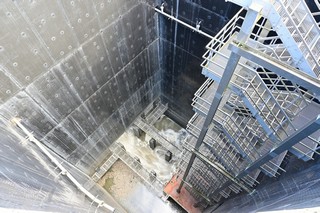
Emschergenossenschaft’s very impressive Pumping Station in the Emscher Catchment
Visit of Huge Pumping Station
To conclude the two days, guests were taken to see the Emschergenossenschaft’s very impressive Pumping Station in the Emscher Catchment with an 8-storey deep shaft and 12 pumps, with a lift of 25m.
Part of Emschergenossenschaft’s multi-billion-euro project, nicknamed the Ruhr Area’s “Sewer Autobahn”, which separated surface water from foul drainage, it served as an inspiring example of Germany’s forward-thinking approach to sustainable water management.

Networking: exchange of ideas, and connecting with peers to form valuable professional relationships.
Takeaways – networking and collaboration: the highlights of the Conference
One of the most significant outcomes of the event was the enthusiasm participants expressed about networking. The conference provided ample opportunities for attendees to connect with peers, exchange ideas, and form valuable professional relationships.
Many participants remarked on the importance of expanding their networks to include experts from across the globe, recognizing that the challenges faced by the underground infrastructure sector demand international cooperation and knowledge sharing.
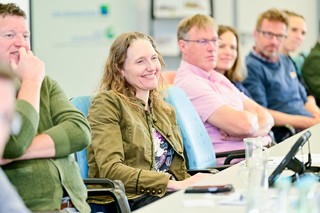
IKT Conference “Sewers for the 21st Century II” took place on 11. – 12. September 2024 in Gelsenkirchen, Germany.
The event also fostered a
deeper understanding of the role that global collaboration plays in overcoming regional sewerage challenges. By connecting with colleagues from various sectors, participants were able to share best practices and innovative solutions, which many are eager to implement in their own projects.
As the conference wrapped up, attendees expressed excitement for future events where they can continue to grow these professional networks and work together to tackle the challenges of modern urban drainage systems.
Conclusion: A Future Driven by Innovation and Collaboration
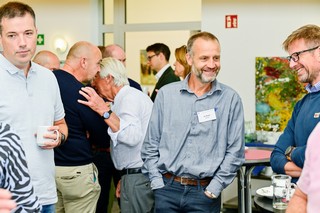
IKT’s international conference: Fresh insights and a renewed commitment to international collaboration – and good fun!
was a landmark event, showcasing the latest innovations and research in sewer and urban drainage management. Attendees left with
fresh insights and a renewed commitment to international collaboration. The conference not only deepened participants’ technical knowledge but also highlighted the importance of
building lasting relationships with industry leaders worldwide.
As we look ahead, it’s clear that the connections forged and the knowledge shared at this event will continue to drive the development of resilient, sustainable infrastructure systems for the future. Participants are already looking forward to future IKT conferences, where they can continue growing their networks and contributing to the global effort of shaping the sewers of the 21st century.
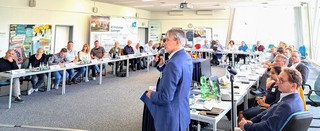
IKT International Conference “Sewers for the 21st Century II” took place on 11. – 12. September 2024 in Gelsenkirchen, Germany.
Click here to view
all conference pictures:
Photo Gallery
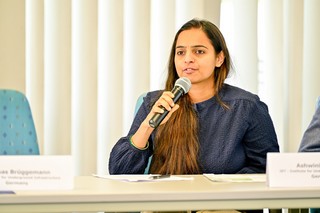
Ashwini Ausekar, IKT
Contact Persons
